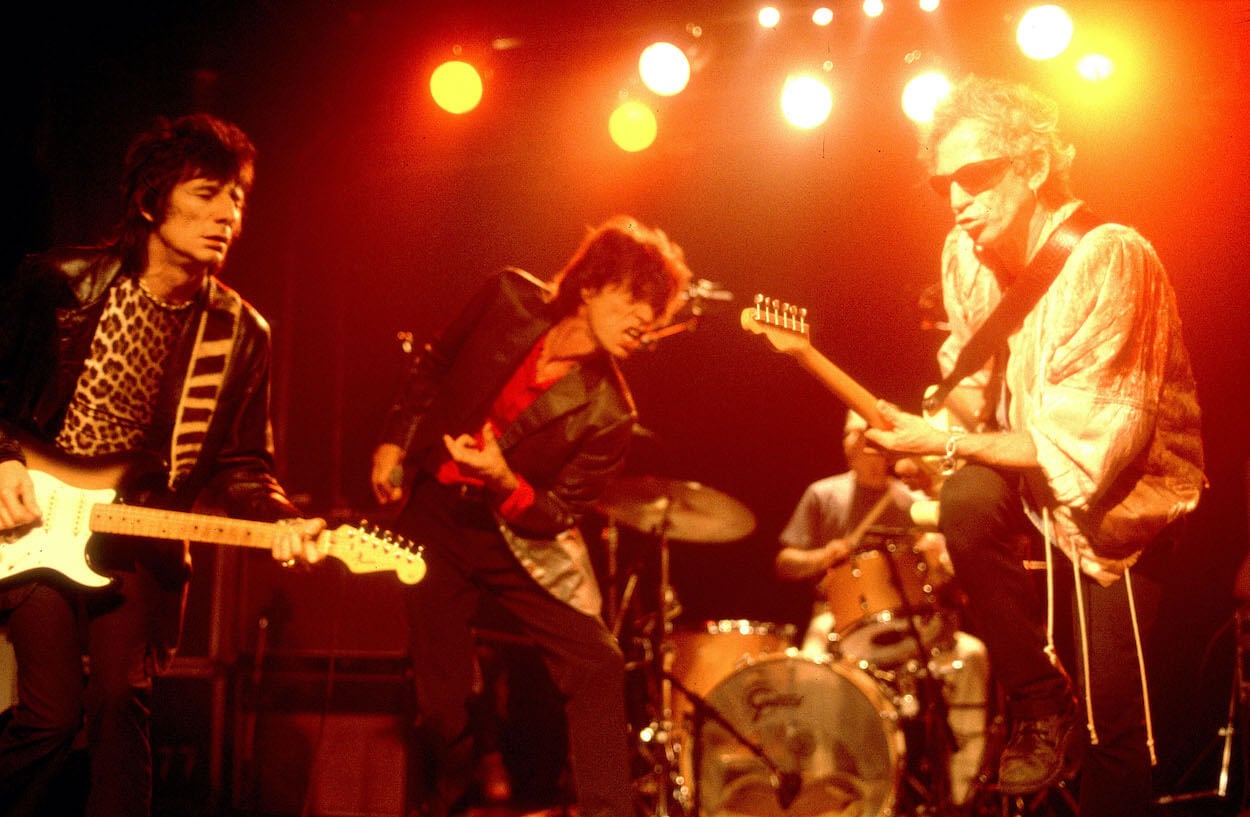
Rolling Stones: Mick Jagger’s 9-Word Response to Keith Richards’ Bloody Brawl With Ronnie Wood Was Completely Mundane
The Rolling Stones cultivated a bad-boy image next to the seemingly squeaky-clean Beatles in the 1960s. The press manufactured the rivalry, but public perception had the Stones as the edgier, grittier band. Sometimes that perception became reality. Ronnie Wood and Keith Richards got into a bloody brawl with each other during one tour stop, and Mick Jagger had the most business-like response when a bloody Wood came to his hotel room.

Ronnie Wood joined The Rolling Stones in 1975
Wood, Jagger, and Richards were already friendly before Wood joined their band. The Stones’ singer and guitarist appeared on Wood’s 1974 solo debut.
While making the album at Wood’s home studio in 1973, he helped write one Rolling Stones hit. He didn’t earn a writing credit (which would have been quite lucrative over the years), but the Stones nodded to Wood for inspiring “It’s Only Rock ‘N’ Roll (But I Like It).”
When Mick Taylor, who also played on Wood’s solo album, left The Rolling Stones, Wood made drummer Charlie Watts crack a joke at his expense during the audition. That might have been a good thing. He joined the band ahead of their 1975 North American tour. Jagger’s matter-of-fact response to a bloody brawl between Wood and Richards came years later.
Mick Jagger had the most mundane response to Wood and Keith Richards’ bloody hotel room brawl
Wood writes freely about his substance use in his autobiography, Ronnie. He heavily used freebase cocaine in the 1980s, including during one Rolling Stones tour. An incensed Richards barged into his hotel room and yelled at him to stop.
So Wood got another room in the same hotel to throw his fellow guitarist off the scent. It didn’t work. When Richards confronted Wood again, it soon led to Jagger making the most mundane comment as Wood bled in front of him.
“Keith got wind of it and formed a posse to come after me … He barged in, broke the bowl, and came straight at my face with it. I turned around and smacked him first in the face, then in the balls, and then in the belly,” Wood writes. ”He was serious about hurting me, and I was serious about hurting him. He smashed a bottle and cut me with it.
“I stormed out of the room and down the corridor to see Mick and Charlie, who were a couple of doors away. I stood there panting and covered in blood. But they were working on a song together and, while I stood there bleeding all over the carpet, Mick looked at me and wondered, ‘Have you got any ideas for the middle eight?’”
From Ronnie Wood’s autobiography Ronnie
The Rolling Stones’ two guitarists were ready to kill each other. Wood stood there bleeding profusely. And yet Jagger had the most mundane, business-like response: “Have you got any ideas for a middle eight?”
Either Jagger wasn’t worried about losing a band member that night, or he knew Wood and Richards would work it out. Decades later, we know which one it was.
The Rolling Stones guitarists get along great
Richards and Wood haven’t necessarily been perfect angels in the intervening years. The two bandmates have had blowups, but they also work it out. They’re like brothers in that way.
Changing a band’s lineup can severely impact its chemistry. Yet Richards once said adding Wood was one of the easiest decisions The Rolling Stones ever made. Original rhythm guitarist Brian Jones did a little bit of everything. Taylor’s talents helped elevate the band during its creative high point in the late 1960s and early 1970s. Still, Richards praised Wood by saying he gave the band unlimited possibilities.
For his part, Wood knows Richards’ talents and strong-willed attitude make him the true leader of The Rolling Stones. It’s what sets him apart from other guitarists.
Violent intraband fights can precipitate a breakup. Mick Jagger’s mundane nine-word response to Ronnie Wood and Keith Richards’ bloody brawl indicates he knew the fight was just a blip on the radar for The Rolling Stones.
How to get help: In the U.S., contact the Substance Abuse and Mental Health Services Administration helpline at 1-800-662-4357.


